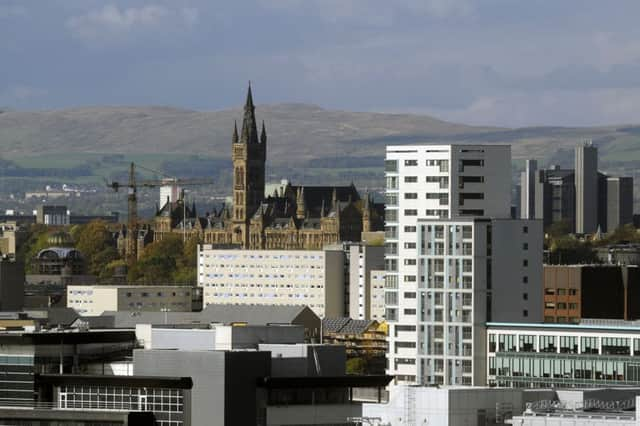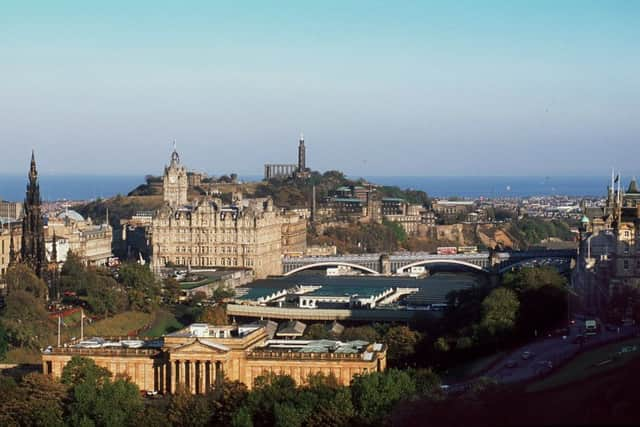Glasgow and Edinburgh compared: politics|economy|culture|


THE BASICS
Glasgow is the largest city in Scotland and the fourth largest in the United Kingdom. The population of Greater Glasgow was estimated to be 596,000 in 2014.
Tangible differences can be found in life expectancies of the two cities. Glasgow has an average life expectacny life expectancy which is one of the lowest in the Scotland at 73 years for men and 78.5 years for women. Edinburgh’s life expectancy is higher than Glasgow and the national average with men expected to live to 75.9 years and women 80.9 years old.
Advertisement
Hide AdAdvertisement
Hide Ad

Both cities are young at heart with 16-29 year olds making up the majority of their populations. There were 142,708 recorded in this age group in Glasgow, making up 23.8 per cent of the population. This figure was mirrored in Edinburgh’s young people who also make up the largest percentage of its population. The number of old people is where the two cities differ - the capital city has almost double the number of 60-74 year olds than Glasgow, as well as more aged at over 75.
Edinburgh’s population of 492, 680 makes up 9.2 per cent of Scotland’s overall population. 239,922 of the those are male while only 252,758 are female.
POLITICS
Much more than the M8 motorway separates Edinburgh and Glasgow. Perhaps the most prominent ideological division between these two city rivals lies within modern politics.
Glasgow en masse, voted to leave the UK in the 2014 independence referendum. In total 54.49 per cent (194,779) of voting Glaswegians opted for separation in contrast with strong unionist support in the capital where 61.10 per cent (194,638) voted to remain in the UK.
However despite differing views on Scotland’s place within the UK both cities are almost entirely represented by the SNP in the Westminster parliament. The SNP won all seven constituencies in Glasgow during the May 2015 General Election and in the capital, only Edinburgh South could hold out against the SNP surge, with four of the five Edinburgh constituencies won by the nationalists. Incidentally Edinburgh South is Scottish Labour’s one and only Westminster seat in Scotland.
ECONOMY
Glasgow has one of the lowest employments rates in Scotland at 64.3 per cent. Unemployment rates for the city have fluctuated in recent years, going from the second highest in 2008 to 28th in 2013.
However, it was still named the jobless capital of the UK after a study released by the Office for National Statistics (ONS) found that 30.2 per cent of homes in Scotland’s largest city housed unemployed families (2012).
Conversely, Edinburgh has much more success on the employment front and has been ranked as one of top three places for average earnings in the UK with 72.9 per cent of all working adults in employemnt (Edinburgh City Council). The average salary in the capital city is £35,784 according to figures by jobs website Adzuna. High-paid jobs in the financial sector, along with continued investment in the city and a buoyant tourist economy, are among the reasons for the high average wage. The most common sectors for employment in Edinburgh according to Monster.co.uk are financial services, banking and software development. The average salary for a worker in Glasgow is almost £5000 less at £30,066. The majority of those employed in Glasgow are in accountancy, call centres or construction sites.
CULTURE
Advertisement
Hide AdAdvertisement
Hide AdOne thing that both cities have in common, is the wide variety of culture they constantly produce. Glasgow was named city of culture in 1990 but still remains one of the most diverse and vibrant culture hubs in the world. A wide range of traditional and contemporary arts and music centres can be found wherever you turn with performing arts organisations The Royal Scottish National Orchestra, National Theatre of Scotland, BBC Scottish Symphony Orchestra, Scottish Opera and Scottish Ballet all residing within the city.
Music venues such as the iconic Barrowlands and King Tut’s have played host to some of the most successful bands from here in Scotland and across the world.
Critically acclaimed art and design galleries and exhibitions are featured across the city from the Gallery of Modern Art, Tron Gate and Tramway who all showcase innovative and cutting-edge art and design creations. Six winners and nine nominees of the Turner Prize have been bred in Glasgow, making it no surprise that the city was chosen to host the 2015 Turner Prize awards.
The list of Glasgow’s cultural exports is extensive, stretching from the much loved Billy Connolly, to Hollywood heart-throb Gerard Butler.
Home to its own cultural community, the city of literature, Edinburgh, is where the world’s largest book and arts festival can be found. Throughout the annual Edinburgh festival, the city is inundated with some of the most diverse and talented performers from across the globe.
The recently refurbished National Museum of Scotland has tourists flock to its exhibitions and welcomed 1.5 million visitors in its first six months of re-opening, The city is also home to The Scottish National Gallery of Modern Art which has seen a renaissance of late, rivalling the work of their English counterpart.